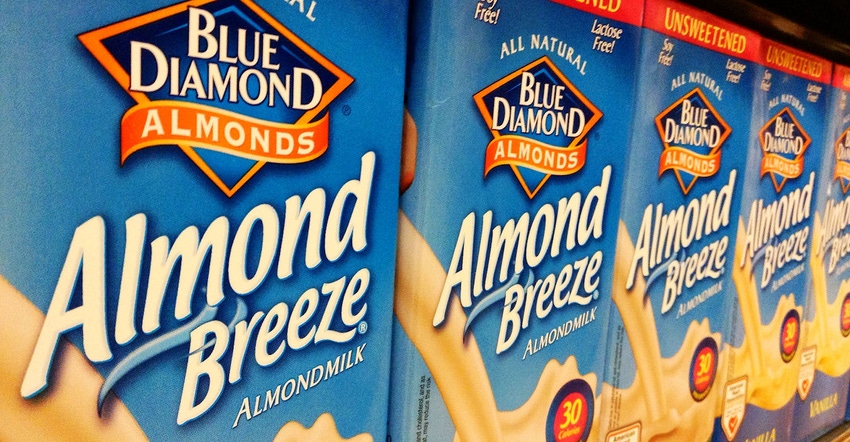Dairy industry fights for label as plant-based alternatives gain ground on cow's milk.

Per capita consumption of fluid milk beverages decreased by close to 22% from 2000 to 2016, yet during the same period, consumption of non-dairy plant-based milk alternatives increased by triple digits. According to a new report from market research firm Packaged Facts, “Dairy & Dairy Alternative Beverage Trends in the U.S., 4th Edition,” the market for dairy and dairy alternative beverages will reach a projected $28 billion by 2021.
Spurring the segment’s growth will be plant-based dairy alternatives, which Packaged Facts said are expected to expand to represent 40% of the combined total of dairy and dairy alternative beverages, up from 25% in 2016, when dairy alternative beverages accounted for barely $6 billion in retail sales.
Nielsen data show that plant-based dairy alternatives are a fast-growing category, with 20% growth and topping $700 million in sales over the past year. The category, which excludes milk, includes plant-based cheeses, yogurt and ice cream. Yogurt shows significant growth, at 56% since last year, according to the data.
Specifically, the plant-based milk category has grown 3.1% since 2016. Over the same period, according to the Nielsen data, sales of cow’s milk are down about 5%.
The shift away from traditional dairy products such as cow’s milk and towards plant-based alternatives revolves around health concerns, with a growing number of consumers coming to believe that plant-based foods are healthier than animal-based foods, the report suggested. Further, it noted that there is a growing base of consumers who are motivated by animal welfare concerns, leading them to choose plant-based beverages and foods over animal-based products.
“Vegetarians and vegans together account for less than 15% of all consumers, and their numbers do not grow very rapidly, but a growing number of consumers identify themselves as 'flexitarian' or 'lessitarian,' meaning that they’ve cut back on their consumption of animal-based foods and beverages. It is this group that is most responsible for the significant and ongoing shift from dairy milk to plant-based milk,” said David Sprinkle, research director for Packaged Facts, which also recently established a free curated webpage on dairy and dairy alternatives.
In recent years, the plant-based dairy beverage alternatives category has seen the expansion of several nut- and legume-based milk alternatives beyond soy, rice, coconut and almond to also include varieties made from cashews, hazelnuts, macadamias, peanuts, pecans and tiger nuts. In addition, there are non-dairy milks made from bananas, cassava, oats and potatoes, among others.
Looking ahead to 2018, Packaged Facts expects several of these new and novel non-dairy milk varieties to find a wider audience:
Barley milk — Pioneering a new plant-based milk alternative category is Canvas, a start-up that has developed a way to convert unused barley grain leftover from the beer brewing process into a sustainable plant-based beverage — a winning idea for consumers concerned about the issues of food waste and sustainability. The line offers five flavors, including original, cold brew latte, cocoa, turmeric chai and matcha. All varieties are free from refined sugar, dairy and artificial ingredients.
Flax milk — The key selling point for flax milk is its high omega-3 content. The leading brand, Good Karma, reports that it offers 1,200 mg per serving of this essential nutrient, further noting that its flax products are free of all major allergens. In addition to its various sweetened and unsweetened, flavored and protein-enhanced flax milks, Good Karma offers flax milk-based drinkable yogurt and eggnog.
Hemp milk — Participants in the hemp production industry have suggested that only 1% of the North American population has ever tried a food or beverage with the ingredient. This is a segment with the potential for rapid growth as consumers look for alternatives to the established plant-based beverage segments. Hemp is an excellent source of omega-3 fatty acids as well as being a good source of plant-based protein, containing 10 essential amino acids.
Pea milk — While the idea of pea milk may sound unappetizing to many, it does have certain advantages over other dairy alternatives that may make it a hit with consumers. For example, the pea milk brand Ripple says one serving has 8 g of protein, the same as cow's milk, compared to about 1 g of protein in coconut or almond milk. In addition, Ripple has half the sugar of cow's milk — something more and more consumers are sensitive to as they watch their waistlines — along with 50% more calcium, plus vitamin D and iron. Ripple offers a pea-based half-and-half product as well as its pea milk line.
Quinoa milk — This beverage formulation is reported to be high in protein, fiber, vitamins and nine essential amino acids. It also contains important minerals such as magnesium, iron, copper, manganese, zinc and phosphorus and has a low glycemic index.
The dairy industry has challenged the notion that plant-based beverages can even be called "milk." In fact, the National Milk Producers Federation has asked the U.S. Food & Drug Administration to enforce its own food standard for milk, which would exclude plant-based products from being referred to as milk.
However, Packaged Facts said federal courts have ruled against efforts to stop plant-based dairy alternatives from being called milk. The Plant Based Foods Assn., a trade association founded in 2016 that represents 88 of the nation’s leading plant-based food companies, has even claimed that FDA’s inaction is an implicit endorsement of the position that labels such as soy milk do not generate confusion among consumers.
About the Author(s)
You May Also Like


.png?width=300&auto=webp&quality=80&disable=upscale)
